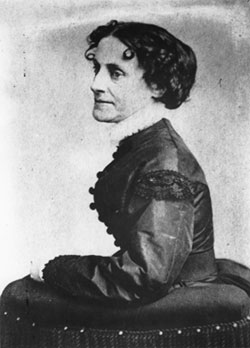| The Library of Virginia >> Exhibitions >> Working Out Her Destiny | ||
 |
||
| Notable Virginia Women - Elizabeth Van Lew (1818-1900) | ||
|
Introduction Where are the Women: |
|
Lifelong
Richmond resident Elizabeth Van Lew (1818–1900) became one of the
most famous and controversial women in nineteenth-century Virginia.
A member of one of the city's leading commercial families and
descended from prominent Philadelphians, Van Lew inherited a few
slaves when her father died and lived in a large mansion on Church
Hill. She remained loyal to the United States after Virginia seceded
in the spring of 1861 and worked to ease the plight of Union
soldiers held as prisoners of war in old warehouses near her home.
During the war she became the most effective Union espionage agent
in the capital of the Confederacy. Her courageous patriotism put her
life and liberty at risk, but she persevered through the end of the
war in her attempts to serve her country. In reward for her work
during the war, President Ulysses S. Grant appointed Van Lew
postmaster of Richmond. The first woman to hold the office, Van Lew
was postmaster (she declined to adopt the title postmistress) for
nearly eight years, during which she played an important leadership
role in the state's Republican Party and facilitated the entry of
African Americans into politics. |
| Late in her life, Van Lew became the object of scorn. People began to call her "Crazy Bet" and to explain her Unionism and her political activism not as acts of patriotism but as the consequences of having an unsound mind or as duplicitous hostility to Virginia values. The widely propagated myths distorted her role in the city's social life and devalued her bravery and significant contributions to the war effort. The myths also led to misrepresentations of women's activities in the South during the Civil War and to a misunderstanding of many other events in those years. Because Van Lew's contribution had been to the Union and not to the Confederacy, it may have seemed irrational or otherwise inexplicable during the hey-day of the Lost Cause interpretation of the Civil War. In fact, Van Lew was not mentally deranged nor did she act irrationally in public. She was not “Crazy Bet,” but Miss Van Lew, a respectable, able, and determined patriot. | ||
